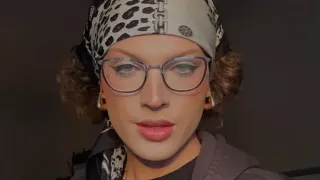April 8, 2016
John Geoffrion on 'Art' and Stage Craft
Kilian Melloy READ TIME: 10 MIN.
John Geoffrion's theatrical career spans two decades. During his time as a fixture on Boston's stage scene, Geoffrion has appeared in plays across the city and the region, taken Best Actor awards for his turn in "Gross Indecency: The Three Trials of Oscar Wilde," and served the Hub Theatre Company of Boston as the company's Artistic Director, as well as directing the Hub's very first production, Israel Horowitz's "Lebensraum," which ran in the spring of 2013.
Now the Hub Theatre Company is in its fourth season, and Geoffrion has been nominated for another IRNE Award, this time for his supporting work in the company's 2015 production of Joe Orton's "Loot." A busy man of many hats, Geoffrion is also starring in the Hub's new production of Yasmina Reza's "Art," a play that sets three Parisian friends at one another's throats when one of them, the wealthy Serge (played by Victor Shopov) drops a fortune on a blank white canvas done by a famous painter. Geoffrion's Marc -- who uses his charm and wit to manipulate the others -- excoriates the purchase, while nice guy Yvan (Bob Mussett) flounders haplessly in the middle.
Geoffrion chatted with EDGE recently about the play, detailing the craft, and the camaraderie, he brings to the stage -- not to mention the role his husband played in getting the actors prepared for their parts.
EDGE: The play is by Yasmina Reza, and it's originally in French. Is the Christopher Hampton translation the one you are using? There might not even be another translation as yet...
John Geoffrion: Hampton's is the only one that I'm aware of. We did track down a copy of the original French script, and it's useful to note some phrases and jokes that didn't translate. There are also some awkward phrases in the script that we're not quite sure if they're because Christopher Hampton is British, and are these British idioms, or was something awkwardly translated? Even from English to English, things get lost in translation.
EDGE: Would you feel comfortable changing those, or are you sticking to what's on the page?
John Geoffrion: Well, we're actually leaving everything as is. We're not even updating any of the monetary [currencies]. We're still using francs, even though they're on the euro, we're not changing any of the amounts, anything like that.
EDGE: Aside from the British language in this specific instance, do you feel that it makes a difference to work with a play in translation as opposed to working with material in its native language?
John Geoffrion: That's a good question, because for all of my experience working on Chekov plays, for example, I've never done a Chekhov play. I've done other people's versions of Chekhov plays. I've done David Mamet's translation of "Uncle Vanya," or all the other various translations out there... It's always filtered through at least one other person, so you're not getting it straight from the source.
I often notice it works the other way as well: A lot of people who were playwrights notable for working on other languages all seem to disparage William Shakespeare, and I was wondering if that's because they have never been able to experience Shakespeare in English. I found Jean Anouilh's translation of a bunch of Shakespeare comedies, and he had to take it all out of verse and put it into prose, and the Seven Ages of Man speech from "As You Like It" is not necessarily butchered, but all the poetry is taken out. I can see how inevitably, something will be lost in translation. We have to do the best we can. We can still get a sense of who the characters are, what their intentions are, and what their objectives are. We can still build on that.
EDGE: You're aided in this in that when you're up on stage, acting is an interpretive art and you might have some leeway.
John Geoffrion: Absolutely, up a point. Any change in the script is just us accidentally paraphrasing. I'm terrible at that, and make stage managers go through acres and acres of line notes.
EDGE: Class and control enter into "Art," to a greater degree, really, than the subject of art does.
John Geoffrion: Absolutely. There's definitely a difference in class between the three characters. Marc's a career man, Serge is very aspirational, and poor Yvan ekes out a modest living. I make sort of offhand remarks to poor Yvan about how the painting cost more than he could earn in a year. We were able to calculate, with exchange rates and inflation, that 200,000 francs in 1994 would be about $60,000 in today's money. Although the contemporary art market has exploded so much that the works of a real-life artist with the cach� of the fictional Antrios would probably sell for over a million dollars; not even Serge could do that.
We're also aware of just how much these characters are under the control of women -- the unseen women in this play. We're noting that Reza is writing a play about men, and how do we compare that to something like David Mamet writing "Boston Marriage," and trying to create female characters?
EDGE: It would be brilliant if you all just had a big slap fight on stage.
John Geoffrion: There are fisticuffs at one point. If I had hair, I suppose I would like for it to be pulled.
[Laughter]
EDGE: Your character Marc is very controlling, and highly opinionated.
John Geoffrion: Oh yeah. I love that because that's the opposite of me. I tend to be more like Yvan in social situations: "Come on everybody, let's get along." I love the fact that I get to play someone who is so closed-minded and rigid in his opinions. And he fancies himself as the Henry Higgins of the group, molding his friends' cultural and literary tastes to build them into someone worthy of his friendship. He's so insecure, I believe, that he just has to impose his will onto [his friends] because he can't hold on to them any other way. It's interesting to see how but the end of the play he's lost so much control over everything. He's having to make peace with that, and it's almost a concession: His last speech of the play is actually him interpreting the artwork as a legitimate piece of art, which he has refused to do for the previous ninety minutes. Everything is not totally tied up at the end; we're talking about the trial period of our friendship; there's no guarantee at the end that their friendship will continue much longer than that dinner they are referring to, outside of the action of the play. Any resolution here is, I think, temporary. A lot like life, I suppose.
EDGE: I have to say, when I heard you had the role of Marc and Victor had the role of Serge, it surprised me. I would have thought it would be the other way around. What an interesting bit of casting you've got there!
John Geoffrion: I know Victor has a very assertive personality as a performer, and he still brings that to his performance. We could easily flip roles; I think we're well cast how we are, but it would be interesting to switch. I get to play much more of an asshole than I normally play in real life. It's still very gratifying.
EDGE: Aside from the friends' specific situation, with their personal histories and dynamics, you have this big canvas sitting there in the room almost literally like a white elephant. Yet, what's projected onto that blank white canvas is what drives the character dynamics. Is it possible to have a discussion about art that is about art -- and not about class or politics or whatever else?
John Geoffrion: It is a bit of a MacGuffin I suppose, because the painting is more of a catalyst to the plot than the plot is itself, and the dialogue is really more focused on the conflict between the characters and how basically the purchase of the art is the catalyst. It could almost be called "Car." It's one of those midlife crisis purchases, to degree, but it's essentially the fact that Serge is asserting his independence form Marc's control. I think that is more the catalyst of the conflict between them than the art. It's kind of ironic: My husband (contemporary Art curator Al Miner) gave us a tour of the MFA's contemporary collection early in the rehearsal process, and he's doing a talkback after one of our performance. Though apart from a few exchanges, there's very little substantive discussion about art.
EDGE: How's the chemistry between you and costars Victor Shopov and Bob Musset? Have you worked with them before now?
John Geoffrion: Not until now. Both Victor and Bob are actors I've admired and wanted to work with for quite a long time. I am very gratified that we established a really good working relationship very early in the process and seem to have an easygoing, conflict-free sort of process. I think we work kind of the same way in our approaches to our characters. Discussion up to a point, and then let's just do the thing. We both seem to be very similar in our political opinions, all the things that help to create a bond off-stage and on. It's been a real pleasure working with him. I always want to work with fantastic actors to challenge and push myself.
And I'm so glad we brought Bob into this as well. He's one of the best character actors in the Boston non-equity scene. Working with these two has just been great. We crack each other up. We're all very focused on the work and we're all putting a lot of effort into this, too. Every day it's been a lot of fun, as we uncover a new layer of the onion, or if we manage to get through a scene without stopping and we get this rhythm going and it starts to really cook, and we all kind of look at each other and look at [director] Dan [Bourque] and think, Wow, something pretty cool is happening here.
We did our design run a few weeks ago and usually that's the first time we do it on its feet form beginning to end. Designers are typically focused on their particular aspect of the show and barely pay any attention to the actual play. I was so shocked when the designers were engaged and laughing throughout. That almost never happens in the design run. That really made us feel confident about the work that we were doing.
EDGE: You just mentioned the director, Director is Daniel Bourque. How's the experience of working with him?
John Geoffrion: We've had a really good working relationship and been good friends for several years now. He's been with the Hub since our first season; he's one of our associate artists now, and thus far he's directed "Sand Mountain," "Three Days of Rain," he directed "Loot" last year, and "Art" now. He's an actors' director, in that he is focused on relationships and character, and I respond well to that.
EDGE: I'm an Orton fan and was absolutely determined to see "Loot" but just couldn't; make it work out, sadly.
John Geoffrion: "Loot" was another play where we had really good chemistry. It's very fulfilling when we do a show that some long-standing reviewers have seen many times, and may come in thinking, "Oh god. I've seen this show five different times now. What more do they have to say?" and then leave saying, "Wow, you guys nailed it!" That's been a particular source of pride for me personally as an artist and as a producer, to see people come into something with some preconceived notions and come away with a new or a deeper appreciation.
EDGE: You are a director in your own right, is that correct?
John Geoffrion: I've directed a few productions with the Hub; since I've come back to New England I've directed another show up in Dover, New Hampshire; we did "Oleanna" shortly after I arrived. Since then I've only directed with Hub ("Lebensraum," "Goodly Creatures" and co-directing "Six Hotels"), but I've directed theatre since I've been out of college, usually in my artistic home town of Portsmouth.
EDGE: Do you enjoy letting someone else take the reigns? Or do you have to clamp down on your inner director and let someone else take control of the show?
John Geoffrion: One thing about having a small cast with a lot of good artists in it, is we all feel like we are collaborators and Dan is sort of the curator of all of our ideas. He does get the chance to say, "Maybe not this, maybe some more of this." But I think we're all making solid artistic contributions toward the vision of the show. That's one thing I like -- as a director, I appreciate that kind of collaborative experience. I don't feel like I've necessarily relinquished control when I don't direct something, and I don't feel like I'm the one in control when I am directing something, because I feel that everyone else's contributions are just as valid. I will never claim as a director that I know everything about the show, and I love being surprised.






